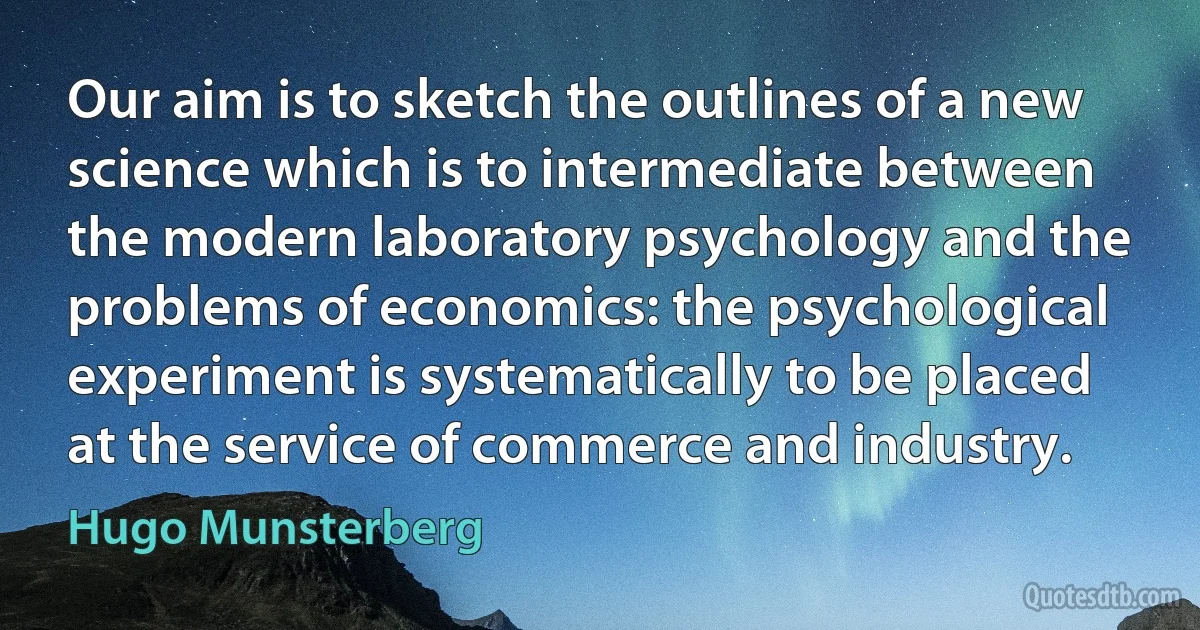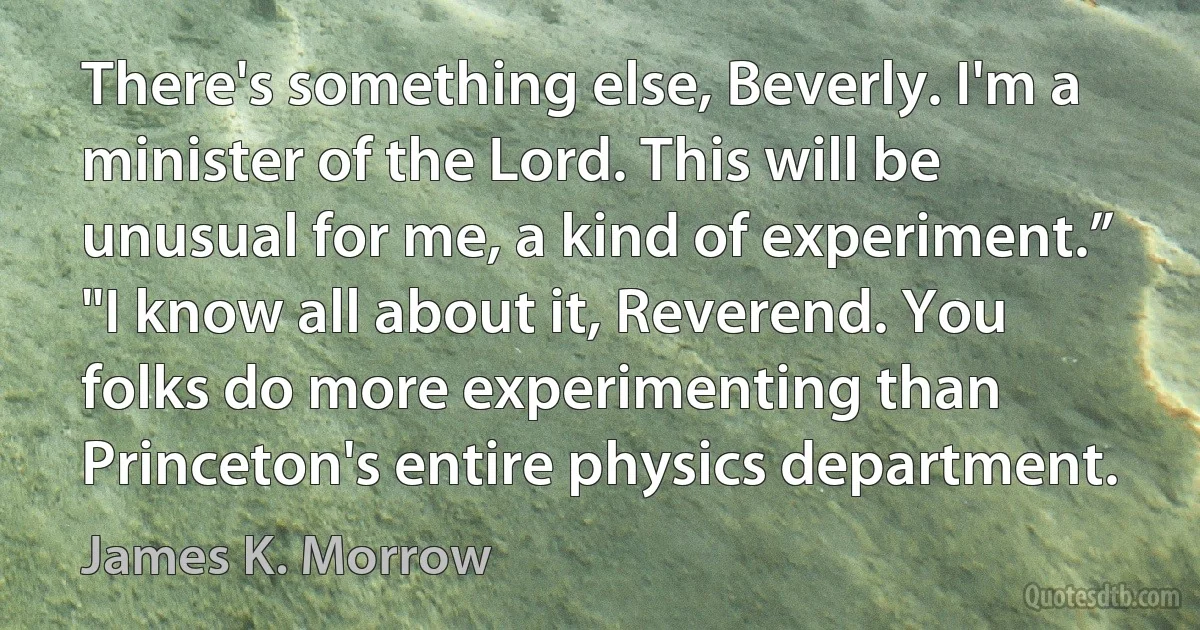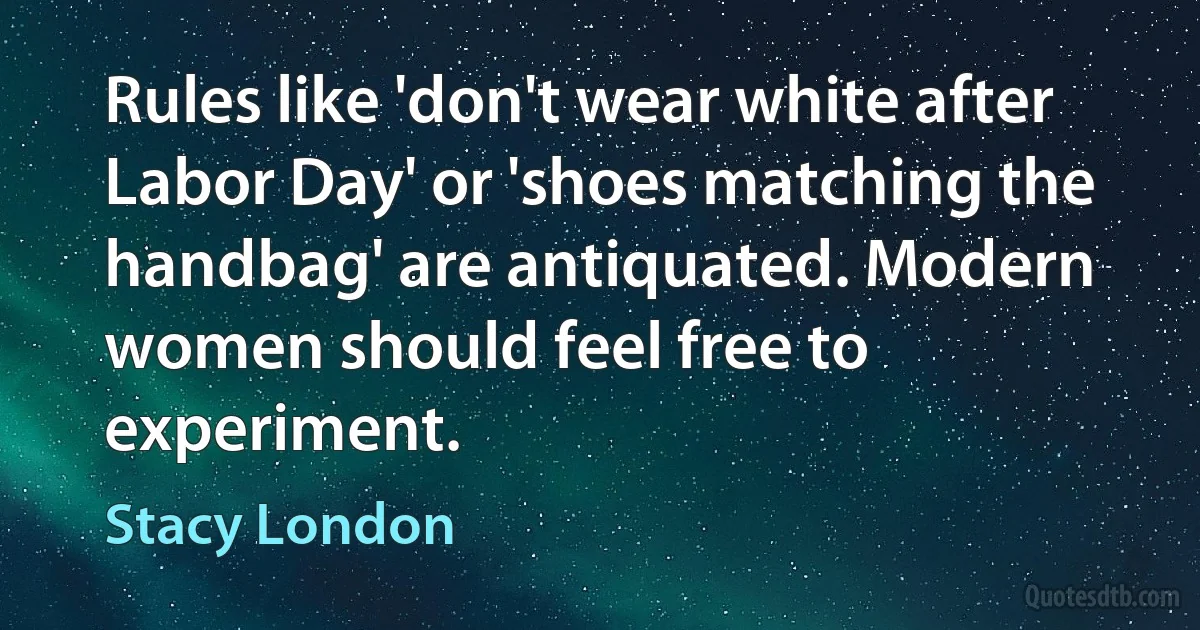Experiment Quotes - page 16
As yet the efficiency of selling goods has not been worked out. Most salesmen believe it cannot be done. They claim that there are too many variables in the problem. Perhaps there are, but nobody knows until the experiment has been thoroughly tried. In every case the victories of Efficiency have been won in spite of the most stubborn opposition from the men who were being helped. And one fact is sure - that the first Advertisers and Sales Managers who try out Efficiency and succeed will find themselves in a gold mine. They will have found a better way to enter a market that handles, in an average year, thirty thousand million dollars worth of goods.

Herbert N. Casson
I expect that soon the failure of the attempts to transform Russia into a Socialist community by methods of dictatorship will become apparent to all. The failure of the Communist experiment in Russia, however, does not mean the downfall of the Bolshevik regime. The two things are not necessarily linked together. Nay, they are mutually exclusive. The same backwardness that makes Socialism in Russia at the present time impossible favors the strengthening of despotism once it has taken root.

Karl Kautsky
In the emerging picture of mankind in the universe, the future (if it exists) will surely entail discoveries about space and time which will open up whole new perspectives in the relationship between mankind, mind, and the uni-verse.... But what is now? There is no such thing in physics; it is not even clear that ‘now' could ever be described, let alone explained, in terms of physics.... Notions such as ‘the past,' ‘the present' and ‘the future' seem to be more linguistic than physical.... There is no universal now, but only a personal one-a ‘here and now.' This strongly suggests that we look to the mind, rather than to the physical world, as the origin of the division of time into past, present, and future....There is none of this in physics.... No physical experiment has ever been performed to detect the passage of time. As soon as the objective world of reality is considered, the passage of time disappears like a ghost into the night.

Paul Davies
Throughout life, all people are engaged in activities – practical or mental – trying to solve problems, activities that themselves give rise to problems. To solve these problems, people need knowledge. They can acquire this personal knowledge in two main ways. First, they can interrogate the world – natural and social – by means of closer observation, deeper analysis, controlled experiment, all forms of cognitive interaction. Second, they can enrich their personal knowledge by communicative interaction with the stock of public knowledge that mankind has built up over the millenia, thus acquiring what we may call information. The activities in which people engage also produce two other kinds of knowledge: that embodied in people (skills) and that embodied in their artefacts.

Brian Campbell Vickery
A New Order of the Ages Begins, says the reverse side of the Great Seal, and the Revolutionaries meant it. The American experiment was consciously conceived as a momentous step in the evolution of the species. The cause of America is in great measure the cause of all mankind, Thomas Paine said in his inflammatory pamphlet Common Sense (1776).

Marilyn Ferguson
In the winter of 2008, Jenifer and I visited Chennai Mathematical Institute. This remarkable Institute is the creation of Seshadri. It is a unique blend of an American style liberal arts college with traditional Indian guru one-on-one teaching, adding physics, computer science, history and music to its maths curriculum. Only in India could an intellectual with no business or management experience, who spends all his spare time singing classical south Indian music, have been the catalyst for such a unique educational experiment.

David Mumford
By marrying experiment to speculation, we put ourselves in a dimmer version of the circumstance of the Creator. We remake nature or we imagine it remade. By this expedient we free ourselves, if only partly and tentatively, from suspicion of our beliefs, and we live once again, unafraid, in the light of the actual.

Roberto Mangabeira Unger
We started with pure parliamentary democracy at the Centre and in the States. Now this has been extended to the grassroots, though not in the Gandhian way, but according to the dream of Gandhiji, along that line. We have extended democracy to the grassroots, in the panchayati raj experiment and I think that has given solid support to our parliamentary system. Our parliamentary system could not have survived, without this basic grassroot support. But all these can function only in an atmosphere of social and economic progress and greater equality.

K. R. Narayanan
The various races and ethnicities into which humans have evolved represent a grand experiment in which nature has tested out some of the variations inherent in the human genome. The experiment is not being conducted in our interests - it has no purpose or goal - yet it offers considerable benefits. Instead of there being a single type of human society, there are many, creating a rich diversity of cultures whose more promising features can be adopted and improved on by others.

Nicholas Wade
The trend in the north is more Punjabi folk and simple music. But, in the past, people like Naushad experimented with Hindustani classical music which I think has been completely forgotten. People don't experiment anymore and think that Hindustani classical music won't work. For me, coming from the south, it was just a little step to learn Punjabi music. The nuances are louder in Punjabi music. Songs like Mukkala muqqabla or Humma humma had more of the Tamil folk music in it.

A. R. Rahman
Over the last 50,000 years, modern humans have been subjected to enormous evolutionary pressures, in part from the consequences of their own social culture. They explored new ranges and climates and developed new social structures. Fast adaption, particularly to new social structures, was required as each population strove to exploit its own ecological niche and to avoid conquest by its neighbors. The genetic mechanism that made possible this rapid evolutionary change was the soft sweep, the reshaping of existing traits by quick minor adjustments in the sets of alleles that controlled them. But what began as a single experiment with the ancestral human population became a set of parallel experiments once the ancestral population had spread throughout the world. These independent evolutionary paths led inevitably to the different human populations or races that inhabit each continent.

Nicholas Wade
An explanation of a phenomenon is regarded, apparently instinctively, as the most general possible when it is a mechanical explanation. The "mechanism" of the process is the ultimate goal of experiment. Now this mechanism in general lies beyond the range of the senses; either by reason of their limitations, as in the case of the atomic structure of matter, or by the very nature of the supposed mechanism, as in the theory of the ether. The only way to bridge the gap between the machinery of the physical process and the world of sense-impressions is to think out some consequence of that mechanism. This we will call the hypothesis. The hypothesis, resting still on the mechanical basis, is yet beyond the range of direct experimental investigation; but if, by mathematical reasoning, a consequence of the hypothesis can be deduced, this will often lie within the range of experimental inquiry, and thus a test of the soundness of the original mechanical conception may be instituted.

J. R. Partington



